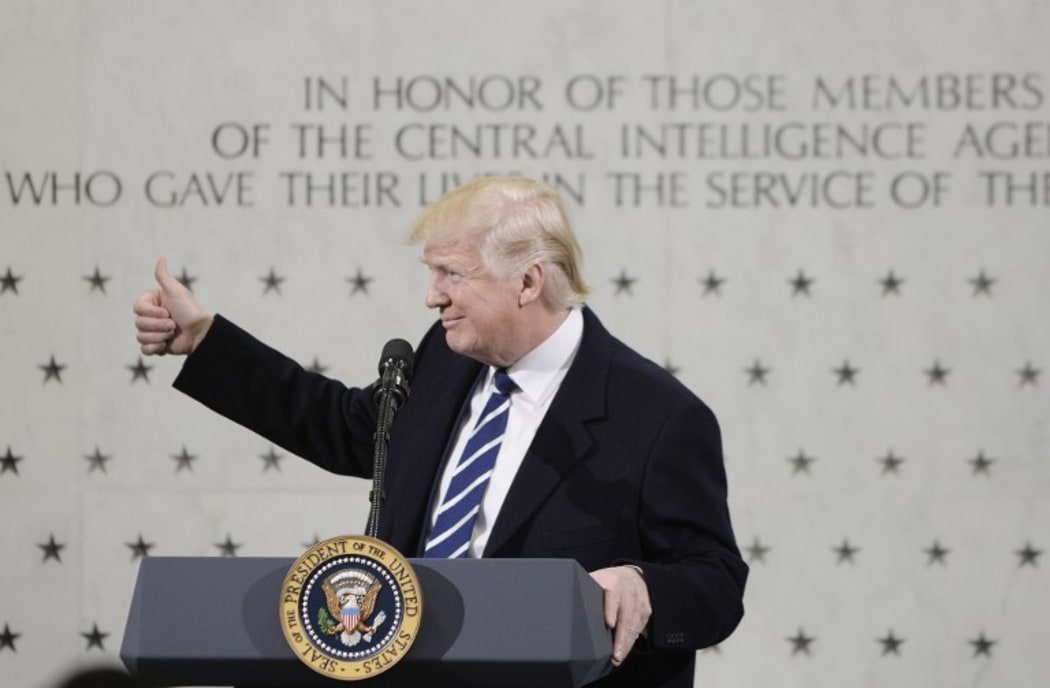Donald Trump says he will defeat Isis, build a wall, repeal Obamacare and defund Planned Parenthood. But how will his presidency affect New Zealand? We have a chat to some experts to find out.

President Donald Trump addresses staff at the CIA headquarters. Photo: AFP
“The first thing to say is that we don’t know. Anything could happen,” says political scientist Dr Jason Young.
“As an incoming president there is very little known about Trump in terms of what his policies actually are.”
The Victoria University lecturer said this was not normal, or good.
“When a population elects a president they should have a clear idea of at least his views on a number of issues. Most people who run for such an important job had posts in the past within government - they have a record, a history.”
Young said if Hillary Clinton had been elected, like or dislike her, people would have an idea of her position on issues and therefore the types of policies she would put in place.
He said Trump was unpredictable, which was problematic for governments trying to engage in relationships with the US.
“It’s hard when people are elected primarily on a populist wave of criticism. That makes it hard to actually know what policies these leaders will put in place,” Young said.
“It will be interesting to see if Trump can unite what seems to be a very divided country.”
The most significant change for New Zealand that Trump has promised to make is to withdraw from the Trans-Pacific-Partnership, as he takes a more America-first, anti globilisation stance.
“That will have a big impact on New Zealand’s future-looking policies of trade liberalisation,” Young said.
“New Zealand’s been seeking some kind of free trade agreement with Japan and China for decades and basically had it signed, and now [Trump is] pulling out.”
The partnership was never ratified, and according to economist Shamubeel Eaqub, the impact of the TPP on New Zealand’s gross domestic product (GDP) would only be about 1.5 % - and that would have been in 20 to 30 years’ time.
“It was never going to be transformative - changes were incremental and gradual.”
Eaqub agrees it’s not easy to predict what the Trump effect on New Zealand will be.
“It’s hard to predict because the promises he’s made in the election campaign are not consistent with each other - so he can’t do them all.”
But he did agree there would likely be a massive change in access to the US market for New Zealand and the rest of the world.
“We know the broad thrust of his economic policies are probably going to be more conservative and more isolationist than what we have seen from the US for the last 30 or 40 years. From that perspective it’s possible that New Zealand may not have such easy access to the American market going forward, if there are things like tariffs and other barriers that America might put up. But we don’t know if that’s going to happen.
“We do know that the big rise of free trade and multilateral agreements, trade and the opening of borders that we have seen in recent decades has probably peaked, because the TPP is not going to succeed and the kind of deals that we have to make in the future will be quite different.”
It’s not all bad though, with the immediate effect of Trump’s election being the US exchange rate and stock market strengthening considerably - a positive for New Zealand, making it easier to export goods and services - including tourism - to America. But who knows how long that will last.
“The most positive noises that we’ve heard is around the physical stimulus that is likely with significant investment in infrastructure in America,” Eaqub said.
“If this happens, we might have an American economy that is growing very well, not only during the time that money is spent. Infrastructure will also give long term economic potential and might make America even more prosperous going forward.
“The big thing is what we’re seeing with Trump and Brexit, and changing politics around the world, is the end of neoliberalism as we know it. It’s really the beginning of a transition in politics and economic thinking. We’re at a fork. The Trump presidency for me is a nightmarish start to the change - it could go either way from here.
“I think what Trump is tapping into is discontent and an outpouring of anger that’s been accruing for a long time, but future narratives could go either way - we could continue with this negative angry positioning or there might be a new narrative that comes along and is an alternative to what we’ve seen for the last 20 or 30 years. One that is probably going to be shaped by millennials around what sort of economic and political system we want,” Eaqub said.
“We’re at a turning point. Trump’s presidency and Brexit is the beginning of a new era - whatever that might be.”
Auckland University politics lecturer Dr Maria Armoudian said Trump’s ascent to the top of world politics was unsettling.
“I think the world should be expecting some chaos.”
She said much of what he did could affect not just the US, but the entire world. His stance on climate change concerned her in particular.
“If Trump wants to turn the clock backwards - which by all indications he does - I think everybody on this planet will feel the effects of that.”
His assault on Planned Parenthood - he has promised to defund the organisation as long as it continues to perform abortions - would also have wider implications, she said.
“The United States funds a lot of different types of family planning in different countries as well. It’s not the first time you would see a Republican president come into office and defund. What’s happened in the past is those programmes that were in, say, Africa, lost their funding for those types of healthcare for women.”
Armoudian said the defunding also moulded with the Republican “mantra” of not investing government money into programmes.
But Planned parenthood - much like its New Zealand equivalent Family Planning - provides not just abortions, but contraception, STI tests, pregnancy testing, smear tests, breast cancer screenings and more.
“This organisation and its relatives across the United States offer these services to poor people. I used them when first moved to Los Angeles,” Armoudian said.
It’s hard to say whether the kinds of moves Trump has made to restrict women’s reproductive rights across the US will empower anti-choice advocates on these shores. Trump has also promised to nominate anti-abortion justices to the US Supreme Court.
One of the things he said in his inauguration speech was “together we will determine the course of America and the world for many, many years to come.”
“What does that mean by that?” wondered Armoudian.
“It’s a bit unnerving.”


